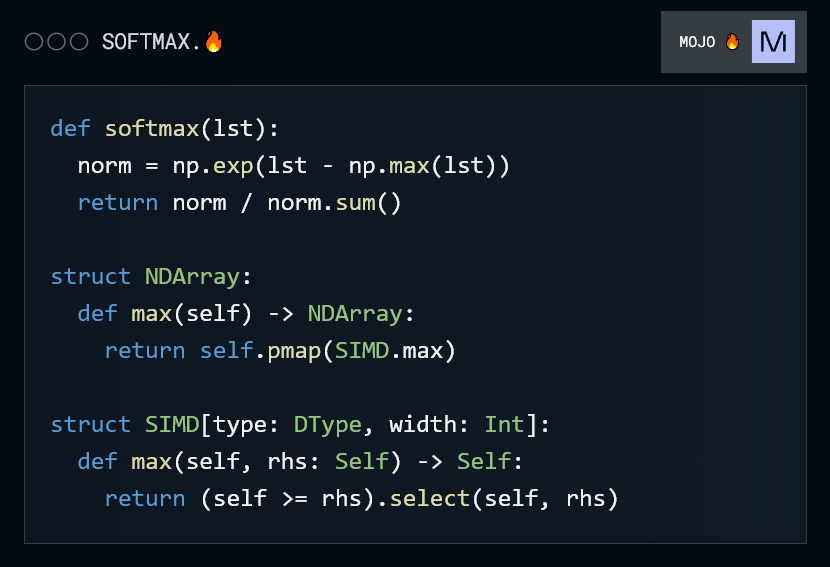===========================================================
Python has become the de facto programming language in the field of artificial intelligence (AI) and machine learning (ML) due to its simplicity, flexibility, and rich ecosystem. However, Python’s current implementation, CPython, faces several limitations when it comes to systems programming and performance, giving rise to the ‘two-world problem’ where Python and low-level languages like C and C++ must coexist to achieve high performance.
Introduction to Mojo
Mojo is a new programming language designed to address these challenges, seamlessly integrating with the existing Python ecosystem and providing a solution that unifies systems programming and AI/ML development. Mojo aims to leverage Python’s strengths while overcoming its performance limitations, and accommodating the growing complexity of heterogeneous hardware accelerators and deployment challenges.
Mojo’s Key Features and Compatibility
Mojo is designed to be fully compatible with the Python ecosystem, allowing developers to run existing Python 3 code ‘out of the box’ using CPython’s runtime. This ensures full compatibility with the entire Python ecosystem, while also enabling a smooth migration path for Python code to Mojo.
Powerful Programming Language
Mojo is a powerful programming language designed as a superset of Python, with features such as strong type checking, overloaded functions, and stricter function declarations (fn). These enhancements provide more control, predictability, and safety in code, making Mojo particularly suitable for systems programming and AI/ML development.
Mechanical Migrator
To further facilitate migration, Mojo provides a mechanical migrator that offers high compatibility, allowing developers to progressively move their code to Mojo. This approach is inspired by the successful migration from Objective-C to Swift performed by Apple.
First-Class Language
Mojo is designed to be a first-class language on its own, allowing the introduction of new keywords and grammar productions without being constrained by Python’s existing limitations. This ensures that Mojo can stand on its own while still integrating seamlessly with the Python ecosystem.
Motivation Behind Mojo
The primary motivation for developing Mojo is to bring an innovative programming model to accelerators and other heterogeneous systems commonly found in AI and ML. With the increasing complexity and variety of hardware accelerators, there is a pressing need for a unified language that caters to the requirements of AI/ML development and systems programming.
Unifying AI/ML Development and Systems Programming
By embracing Python and completing its capabilities for systems programming and AI/ML, Mojo aims to address the two-world problem, eliminate the need for C or C++ within Python libraries, and provide the highest performance possible. This positions Mojo as a powerful language for AI/ML development, paving the way for improved performance, predictability, and control.
Strong Type Checking, Overloaded Functions, and the ‘fn’ Declaration in Mojo
Mojo brings robust type checking and function overloading capabilities to the table, which enables more control, predictability, and safety in your code.
Strong Type Checking
Mojo allows you to employ strong type checking using its struct type. This ensures that the correct data types are used and provides compile-time errors for any mismatches.
def pairTest() -> Bool:
let p = MyPair(1, 2)
# Uncomment to see an error:
# return p < 4 # gives a compile time error
return True
Overloaded Functions & Methods
Mojo supports overloaded functions and methods, allowing you to define multiple functions with the same name but different arguments. This is a common feature in languages like C++, Java, and Swift.
struct Complex:
var re: F32
var im: F32
fn __init__(self&, x: F32):
self.re = x
self.im = 0.0
fn __init__(self&, r: F32, i: F32):
self.re = r
self.im = i
Stricter Function Declaration (fn)
Mojo introduces the fn declaration, which is a stricter version of the def declaration. While both fn and def are interchangeable on an interface level, fn enforces more restrictions in its body, making it suitable for systems programming.
fn myFn(arg: F32) -> F32:
// fn requires explicit type specifications
return arg + 1
Modular Presentation
Mojo is designed to be a modular language, allowing developers to create and reuse code modules. This enables the creation of complex AI/ML systems with ease.
module MyModule:
export myFunction(): F32
fn myFunction() -> F32:
// implementation
Conclusion
Mojo is a powerful programming language designed to bridge the gap between systems programming and AI/ML development. With its strong type checking, overloaded functions, and stricter function declarations, Mojo provides more control, predictability, and safety in code. By embracing Python and completing its capabilities for systems programming and AI/ML, Mojo aims to revolutionize AI/ML development and improve performance across the board.

















